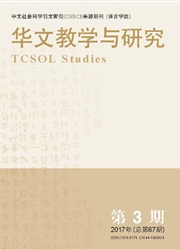

 中文摘要:
中文摘要:
采用实验方法探讨对外汉语词汇教学中语义相关教学与语义不相关教学的效果。共选取32个汉语名词,分别来自蔬菜、家电、动物和身体器官四个语义类别,每个语义类别各有8个词汇。在语义相关组中,学习材料为根据每个语义类别编写的4个故事。在语义不相关组中,从每个语义类别中各随机选取两个词汇,编写4个故事作为学习材料。两组学习者每学完一个学习材料,分别进行一次即时和延时后测,后测包括再认测试和回忆测试。实验结果显示:两种词汇教学方法在即时和延时再认测试上存在显著差异,语义不相关组的学习效果优于语义相关组;两种词汇教学方法在即时回忆测试上存在显著差异,语义不相关组的学习效果优于语义相关组;在延时回忆测试上,语义不相关组的学习效果与语义相关组边缘显著。本研究的实验结果证明语义不相关的词汇教学更能促进初级汉语学习者的词汇学习。
 英文摘要:
英文摘要:
An experiment was designed to investigate the effects on Chinese vocabulary acquisition by teaching two sets of new words:semantically related words and semantically unrelated words. 32 concrete nouns were chosen from 4 semantic categories which are vegetables,household appliances,animals,and body parts. The teaching materials are four stories with semantically related words(one category per story)or four with semantically unrelated words(four categories per story). Then participants completed an immediate test including recall task and recognition task after learning per story. Six days later,there was a delayed test including recall task and recognition task. The results indicated that the performance of semantic unrelated group surpasses that of the semantic related one:(1)semantic unrelated group did better than their counterparts on recognition task of the immediate and delayed tests;(2)semantic unrelated group did better than their counterparts on recall task of the tests,especially the immediate tests.
 同期刊论文项目
同期刊论文项目
 同项目期刊论文
同项目期刊论文
 期刊信息
期刊信息
